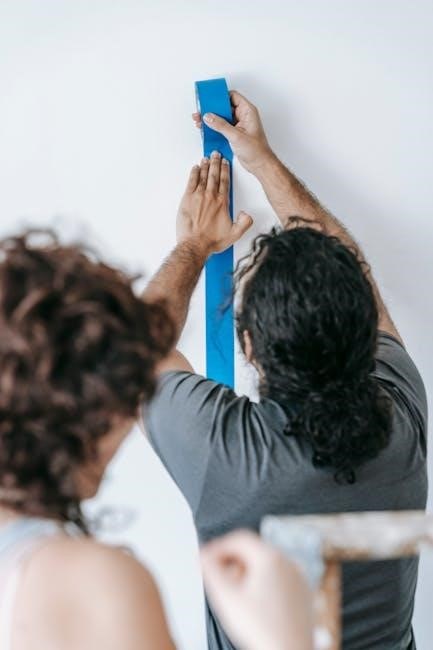the couple’s guide to thriving with adhd
Navigating ADHD as a couple requires empathy, understanding, and tailored strategies. This guide offers practical advice to strengthen communication, manage challenges, and foster a resilient partnership.
1.1 Understanding the Impact of ADHD on Relationships
ADHD can significantly influence relationship dynamics, affecting communication, emotional regulation, and daily interactions. Partners may experience frustration due to forgetfulness, impulsivity, or inattention, leading to feelings of neglect or misunderstanding; It’s crucial for both individuals to recognize how ADHD impacts behaviors and emotions, as well as how it may strain intimacy and trust. By acknowledging these challenges, couples can begin to adapt and strengthen their bond, fostering a resilient partnership that thrives despite ADHD-related obstacles.
1.2 The Importance of Communication and Empathy
Effective communication and empathy are cornerstone strategies for couples navigating ADHD. Open dialogue helps partners express needs, feelings, and concerns, fostering mutual understanding. Empathy bridges gaps caused by ADHD-related challenges, such as impulsivity or forgetfulness, allowing both individuals to feel heard and validated. By actively listening and acknowledging each other’s perspectives, couples can build trust and strengthen their emotional connection, creating a foundation for resilience and growth in their relationship.
1.3 Setting Realistic Expectations for Both Partners
Setting realistic expectations is vital for couples thriving with ADHD. Understanding each partner’s capabilities and limitations helps reduce frustration and builds a supportive environment. Recognizing that ADHD impacts organization, time management, and focus allows for patience and adaptability; Establishing clear, achievable goals fosters mutual understanding and alignment. By acknowledging that progress may be uneven, couples can celebrate small successes and adjust expectations as needed, promoting a balanced and resilient relationship.

Understanding ADHD in the Context of a Relationship
Understanding ADHD’s impact on relationships is key to thriving as a couple. It affects communication, emotional regulation, and daily interactions, requiring awareness and empathy from both partners.
2.1 What is ADHD and How It Affects Adults
ADHD, or Attention-Deficit/Hyperactivity Disorder, is a neurodevelopmental condition characterized by symptoms such as inattention, hyperactivity, and impulsivity. In adults, it often manifests as difficulty with time management, organization, and maintaining focus. This can lead to challenges in professional and personal relationships, including forgetfulness, procrastination, and emotional dysregulation. Adults with ADHD may also experience difficulties with task completion, following through on commitments, and managing stress. These symptoms can strain partnerships if not understood or addressed collaboratively by both partners.
2.2 Common Challenges Faced by Couples with ADHD
Couples with ADHD often face unique challenges, including communication breakdowns, misunderstandings, and emotional dysregulation. Impulsivity and forgetfulness can lead to frustration, while differing organizational styles may cause conflict. Time management issues and difficulty maintaining focus can impact shared responsibilities, creating tension. Additionally, emotional sensitivity and unpredictable reactions may strain the relationship. Understanding these challenges is crucial for developing strategies to navigate them effectively and strengthen the partnership.
2.3 The Difference Between ADHD in Men and Women
ADHD manifests differently in men and women, often influenced by societal expectations and symptom expression. Men are more likely to exhibit overt hyperactivity and impulsivity, while women may experience inattentive symptoms, emotional dysregulation, and internalized struggles. Diagnosis rates vary, with men being more frequently diagnosed due to noticeable behavioral issues. Women often face delayed diagnoses, as their symptoms may overlap with anxiety or depression. Understanding these gender differences is key to providing tailored support and fostering a supportive relationship dynamic for both partners.

Building Effective Communication Strategies
Effective communication is key to managing ADHD’s impact on relationships. By mastering verbal and non-verbal techniques, couples can foster understanding, reduce conflicts, and strengthen their bond.
3.1 Active Listening and Its Role in Conflict Resolution
Active listening is a cornerstone of effective communication, especially in ADHD-affected relationships. By fully engaging with your partner—maintaining eye contact, nodding, and paraphrasing—you create a safe space for expression. This technique helps clarify misunderstandings, reduces defensiveness, and fosters empathy. In conflicts, active listening can de-escalate tensions, allowing both partners to feel heard and validated. Over time, it builds trust and strengthens the emotional connection, making resolution more achievable and relationships more resilient.
3.2 Using “I” Statements to Avoid Blame
Using “I” statements is a powerful communication tool that shifts focus from blame to personal experience. Instead of accusatory language like “You always forget,” try “I feel overwhelmed when plans change last minute.” This approach reduces defensiveness and encourages open dialogue. By expressing feelings and needs without assigning fault, both partners can address issues collaboratively. “I” statements foster a supportive environment, helping couples navigate ADHD challenges with empathy and mutual understanding, rather than conflict.
3.3 Scheduling Regular Relationship Check-Ins
Regular relationship check-ins are essential for maintaining open communication and understanding in couples affected by ADHD. Schedule a weekly “state of the union” discussion to address concerns, celebrate successes, and align on goals. Choose a quiet, distraction-free environment to ensure focus. Use active listening and empathy to foster connection. These check-ins help prevent misunderstandings and emotional overwhelm, allowing both partners to express needs and feelings safely. Consistency builds trust and strengthens your partnership, creating a foundation for long-term success and emotional intimacy.

Practical Strategies for Managing ADHD Together
Implementing structured routines, using task management tools, and minimizing distractions can significantly improve daily life for couples with ADHD. Open communication and shared responsibilities foster balance and harmony.
4.1 Creating a Daily Routine That Works for Both Partners
Establishing a consistent daily routine is crucial for couples navigating ADHD together. By aligning schedules and setting clear expectations, both partners can enhance organization and reduce stress. Incorporating time blocks for tasks, meals, and relaxation ensures structure while allowing flexibility. Open communication about needs and preferences helps tailor the routine to suit both individuals, fostering harmony and mutual support. This collaborative approach not only improves productivity but also strengthens the emotional bond within the relationship.
4.2 Tools and Apps for Task Management and Organization
Utilizing task management tools and apps can significantly enhance organization and productivity for couples with ADHD. Apps like Trello and Asana allow shared to-do lists and reminders, helping both partners stay on track. Time management tools such as Focus@Will or Pomofocus encourage structured work sessions, reducing distractions. Additionally, apps like Habitica gamify tasks, making organization more engaging. By leveraging these tools, couples can break down tasks, set reminders, and track progress together, fostering a more organized and productive life.
4.3 Minimizing Distractions and Creating a Conducive Environment
Creating a distraction-free environment is crucial for managing ADHD. Couples can minimize interruptions by designating quiet spaces for tasks and using tools like noise-cancelling headphones. Implementing visual cues, such as color-coded schedules, helps maintain focus. Decluttering shared areas reduces sensory overload, promoting calmness. Establishing time blocks for tasks and breaks can enhance productivity. By working together to tailor their surroundings, couples can create an environment that supports attention and reduces stress, fostering a more balanced and efficient daily routine.

Emotional Support and Understanding
Emotional support is vital for couples navigating ADHD. Creating a safe, non-judgmental space fosters trust and intimacy, allowing both partners to thrive emotionally and feel deeply understood.
5.1 How to Be an Emotional Safe Haven for Your Partner
Being an emotional safe haven involves creating a non-judgmental space where your partner feels secure and valued. Practice active listening, validate their feelings, and offer reassurance without criticism. Consistency and patience are key, as individuals with ADHD may experience emotional dysregulation. Encourage open communication by expressing empathy and understanding. By fostering trust and reliability, you help your partner feel grounded and supported, strengthening your emotional connection and resilience as a couple.
5.2 Recognizing and Managing Emotional Triggers
Emotional triggers can escalate conflicts in ADHD-affected relationships. Identify patterns in your partner’s reactions, such as frustration or impulsivity, often linked to feelings of overwhelm or criticism. Open communication is key—encourage your partner to share what upsets them. Use “I” statements to express feelings without blame, fostering a safe environment for discussion. Address triggers proactively by establishing routines or stress-reduction practices. Understanding and addressing these triggers can prevent conflicts and strengthen emotional stability in your relationship.
5.3 Practicing Self-Compassion and Avoiding Self-Criticism
Self-compassion is vital for managing ADHD-related challenges. Acknowledge struggles without self-judgment, fostering resilience. Replace self-criticism with kindness, understanding that imperfections are part of growth. Mindfulness and positive affirmations can help cultivate this mindset. Recognize that progress, not perfection, is the goal. By embracing self-compassion, both partners can reduce stress and build emotional stability, strengthening their relationship and overall well-being.
Financial Management and ADHD
Effective financial management is crucial for couples with ADHD. Create shared budgets, track expenses, and set realistic goals to reduce stress and build financial stability together.
6.1 Tips for Managing Impulsive Spending
Impulsive spending can strain a relationship; To manage this, couples should create a shared budget, use cash for discretionary spending, and implement a 24-hour waiting period for non-essential purchases. Open communication about financial goals helps reduce impulse buying. Utilizing budgeting apps like Mint or YNAB can also provide transparency and accountability. Setting financial boundaries and rewarding progress fosters a sense of teamwork and mutual support, helping both partners feel secure and aligned in their financial decisions.
6.2 Creating a Budget That Accounts for ADHD Challenges
Creating a budget for couples with ADHD requires simplicity and flexibility. Use visual tools like charts or apps to track spending. Categorize expenses into needs, wants, and unexpected costs. Allocate a small portion for impulsive purchases to prevent overspending. Schedule regular financial check-ins to review progress without overwhelming either partner. Ensure both partners are involved in the process to maintain accountability and teamwork. Celebrate small victories to stay motivated and foster a positive approach to financial management.
6.3 Using Technology to Track and Control Expenses
Technology can be a game-changer for managing finances in couples with ADHD. Use apps like Mint or You Need A Budget (YNAB) to track spending in real time. Set reminders for bill payments and create digital budgets that are easy to adjust. Tools like Digit or Qapital can automate savings, reducing impulsive spending. Shared access to these platforms fosters transparency and collaboration. Regularly reviewing financial data together helps identify patterns and prevents overspending, promoting financial stability and reducing ADHD-related stress.

Intimacy and Emotional Connection
Emotional intimacy strengthens physical connection, fostering trust and understanding. Strategies like distraction-free time and structured communication help couples with ADHD build deeper, more meaningful relationships.
7.1 Maintaining Intimacy Despite ADHD Challenges
Maintaining intimacy with ADHD requires intentional effort and understanding. Emotional intimacy often suffers due to distractions or impulsivity, but structured communication can help. Couples should prioritize quality time, free from distractions, to foster connection. Scheduling intimate moments can create predictability, reducing anxiety. Open conversations about needs and desires are crucial, as ADHD may affect emotional expression. Empathy and patience are key to navigating challenges, ensuring both partners feel valued and heard. Small, consistent gestures of affection can also strengthen the bond and keep intimacy alive despite ADHD obstacles.
7.2 The Role of Emotional Intimacy in a Thriving Relationship
Emotional intimacy is the cornerstone of a thriving relationship, fostering trust, connection, and mutual understanding. For couples impacted by ADHD, it can be challenging to maintain due to impulsivity or distractibility. However, nurturing emotional intimacy through active listening, empathy, and consistent communication strengthens the bond. Feeling understood and secure allows both partners to express themselves freely, creating a safe emotional haven. Prioritizing emotional connection helps counterbalance ADHD-related challenges, ensuring a resilient and fulfilling relationship. It’s about building trust and fostering a sense of togetherness that transcends daily struggles.
7.3 Overcoming Barriers to Physical Intimacy
Physical intimacy can be challenging for couples with ADHD due to distractions, impulsivity, or inconsistent focus. Open communication about desires and boundaries is essential to navigating these challenges. Creating a distraction-free environment and setting realistic expectations can help reignite connection. Emotional intimacy often lays the groundwork for physical closeness, so fostering trust and understanding is key. By addressing these barriers together, couples can build a more fulfilling and intimate relationship despite ADHD-related obstacles.

The Role of Therapy and Support Systems
Therapy and support systems play a crucial role in helping couples with ADHD navigate challenges together. They provide tailored strategies and a supportive community to enhance relationship resilience.
8.1 Benefits of Couples Therapy for ADHD
Couples therapy tailored for ADHD offers a safe space to address relationship challenges. It enhances communication, helps partners understand ADHD’s impact, and fosters empathy. Therapists provide strategies to manage symptoms collectively, improving intimacy and reducing conflict. By addressing emotional triggers and developing coping mechanisms, therapy strengthens the bond and equips couples with tools for long-term success. It’s a collaborative process that empowers both partners to thrive together, transforming challenges into opportunities for growth and deeper connection.
8.2 Finding the Right Therapist for Your Needs
Finding the right therapist is crucial for addressing ADHD challenges in your relationship. Look for professionals with expertise in ADHD and couples therapy. Ensure they understand how ADHD impacts both partners differently. A good therapeutic relationship is key, so prioritize a therapist whose communication style resonates with you both. Check credentials, ask questions, and schedule a consultation to gauge compatibility. The right therapist will tailor strategies to your unique needs, fostering growth and understanding. Their guidance can help you navigate challenges effectively and strengthen your partnership.
8.3 The Importance of Support Groups for Both Partners
Support groups play a vital role in helping couples thrive with ADHD. These groups provide a safe space for both partners to share experiences, gain insights, and connect with others facing similar challenges. They offer emotional support, practical advice, and a sense of community, reducing feelings of isolation. Support groups also empower partners to better understand each other’s perspectives, fostering empathy and collaboration. By participating together, couples can learn new strategies and strengthen their relationship, while individually gaining tools to manage ADHD’s impact on their lives.

Raising Awareness and Education
Education and awareness are foundational for couples navigating ADHD. Understanding the condition empowers both partners to implement effective strategies, fostering a supportive and resilient relationship environment.
9.1 Educating Yourself About ADHD
Educating yourself about ADHD is crucial for understanding its impact on your relationship. Start by researching ADHD symptoms, such as inattention, hyperactivity, and impulsivity. Learning how these traits affect daily interactions and communication can help you address challenges effectively. Utilize books, online resources, and professional guidance to gain insights into ADHD management strategies. This knowledge empowers you to support your partner while fostering a more empathetic and understanding relationship dynamic. Continuous learning ensures you stay informed and adaptable to the evolving needs of your partnership.
9.2 Sharing Information with Family and Friends
Sharing information about ADHD with family and friends can foster understanding and support. Be open about how ADHD affects your relationship, but set boundaries to protect your privacy. Educate others using simple, approachable language and provide resources like books or articles. This helps them grasp the challenges and how they can assist. Encouraging others to learn about ADHD creates a more supportive environment, reducing misunderstandings and strengthening your collective support system. Transparency and education can lead to greater empathy and involvement from loved ones.
9.3 Advocating for ADHD Awareness in Your Community
Advocating for ADHD awareness in your community can make a significant difference by reducing stigma and fostering understanding. Start by organizing local events, such as workshops or support groups, where individuals can share their experiences and learn about ADHD. Partnering with schools, libraries, or community centers can help spread the word. Use social media to share educational content and personal stories, raising awareness and encouraging others to get involved. By advocating, you create a more supportive environment and empower others to take action, fostering a culture of acceptance and inclusion for those affected by ADHD.

Thriving Together: Long-Term Strategies
Building a resilient partnership involves commitment to growth, adaptability, and celebrating progress. Focus on shared goals, embrace change, and nurture a supportive environment for long-term success.
10.1 Celebrating Small Victories and Milestones
Celebrating small victories and milestones is crucial for fostering resilience and motivation in your relationship. Recognizing progress, no matter how minor, strengthens your bond and reinforces positive behaviors. Acknowledge achievements like completing tasks, maintaining routines, or emotional breakthroughs. This practice creates a supportive environment where both partners feel valued and encouraged. By focusing on successes, you build confidence and reinforce the idea that growth is a shared journey. Regularly reflecting on these milestones can also help you stay aligned and motivated toward your long-term goals together.
10;2 Focusing on Shared Goals and Aspirations
Focusing on shared goals and aspirations strengthens your relationship and provides a sense of purpose. Aligning your visions creates unity and mutual motivation, helping you overcome ADHD challenges together. Break larger objectives into smaller, achievable steps to maintain focus and celebrate progress. Regularly revisiting and adjusting your goals ensures they remain relevant and inspiring. Shared aspirations foster teamwork, accountability, and a deeper emotional bond, helping you thrive as a couple and build a fulfilling future together.
10.3 Embracing Change and Flexibility in Your Relationship
Embracing change and flexibility is vital for thriving as a couple with ADHD. Life’s unpredictability can disrupt plans, but adaptability strengthens your bond. Open communication about changes fosters understanding and reduces frustration. Flexibility allows both partners to adjust routines, minimizing stress and promoting harmony. By being resilient and accepting of life’s uncertainties, you create a supportive environment where both partners can flourish. Celebrate your ability to adapt together, turning challenges into opportunities for growth and connection.
Empowered with strategies and resilience, couples can thrive despite ADHD challenges. This guide equips you with tools to nurture a loving, supportive relationship; Embrace your journey together, knowing that understanding and adaptability are your strongest allies. Celebrate small victories, focus on shared goals, and remain flexible. Your bond can overcome any obstacle, leading to a fulfilling and joyful partnership.
11.1 Recap of Key Strategies for Thriving with ADHD
To thrive as a couple with ADHD, focus on open communication, empathy, and shared routines. Use tools like task apps and budgets to stay organized. Prioritize emotional support and intimacy, and seek therapy when needed. Educate yourselves about ADHD and leverage support systems. Celebrate small victories, remain flexible, and adapt to challenges together. By embracing these strategies, you can build resilience and foster a fulfilling, loving relationship despite ADHD complexities. Consistency, understanding, and teamwork are your most powerful tools for long-term success.
11.2 Encouragement for the Journey Ahead
Embracing life with ADHD as a couple is a journey of growth and connection. Remember, every challenge is an opportunity to strengthen your bond and resilience. Celebrate small victories, and don’t be too hard on yourselves during setbacks. With commitment and compassion, you can navigate ADHD’s complexities and build a fulfilling relationship. Stay hopeful, focus on shared goals, and cherish the moments of joy and progress. Together, you can create a future filled with understanding, love, and mutual support. Every step forward is a testament to your dedication and teamwork.
11.3 Final Words of Hope and Resilience
Thriving with ADHD as a couple is a testament to love, resilience, and shared determination. Remember, ADHD does not define your relationship—it amplifies opportunities for growth and deeper connection. Every challenge overcome strengthens your bond, and every moment of understanding fosters intimacy. Embrace the journey with hope, knowing that together, you can create a life filled with joy, purpose, and mutual support. Celebrate progress, no matter how small, and remain committed to your shared vision of a fulfilling future. Love and resilience will guide you forward.

Additional Resources and Further Reading
Explore recommended books, online communities, and apps to help couples manage ADHD. These resources offer practical tools and support for fostering a resilient and thriving relationship.
12.1 Recommended Books on ADHD and Relationships
Discover insightful books that address ADHD’s impact on relationships. Titles like “The Couple’s Guide to Thriving with ADHD” by Melissa Orlov and “ADHD After Dark” by Dr. Daniel Amen offer practical advice. Additionally, “Delivered from Distraction” by Dr. Edward Hallowell provides strategies for managing ADHD together. These books are invaluable resources for understanding and navigating the challenges of ADHD in partnerships, offering both emotional support and actionable strategies for couples seeking to strengthen their relationship.
12.2 Online Communities and Forums for Support
Joining online communities and forums can provide invaluable support for couples navigating ADHD. Platforms like Reddit (e.g., r/ADHD and r/ADHD_Partners) and Facebook groups such as “ADHD Couples Support” offer spaces to share experiences and advice. Specialized forums like ADDA (Attention Deficit Disorder Association) and CHADD (Children and Adults with Attention Deficit/Hyperactivity Disorder) also host discussions tailored to ADHD challenges. These communities reduce isolation, foster connection, and provide practical strategies for thriving together.
12.3 Apps and Tools to Aid in Managing ADHD
Utilizing apps and tools can significantly support ADHD management for couples. Apps like Trello and Todoist help organize tasks, while Focus@Will provides music to enhance concentration. Evernote and Google Keep assist with note-taking and reminders. Time management tools such as Forest encourage productivity through gamification. These resources enable better collaboration, helping couples create structured routines and reduce distractions, fostering a more balanced and thriving relationship. By leveraging technology, partners can address ADHD challenges more effectively together.
